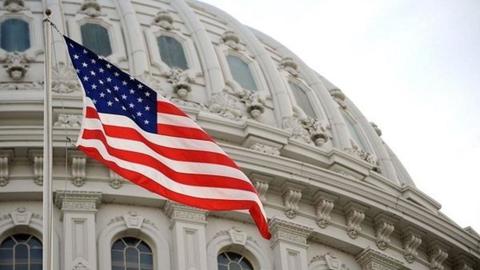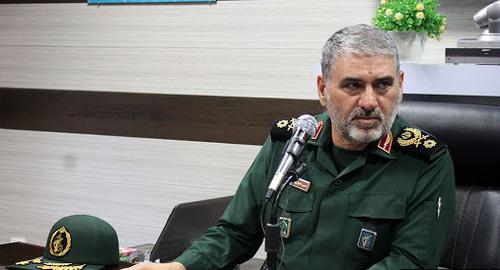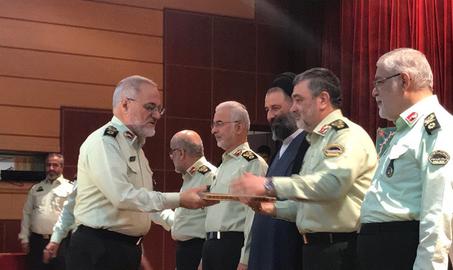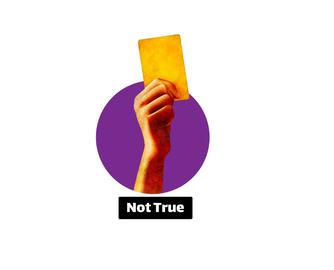On Wednesday, May 20, the US Department of the Treasury’s Office of Foreign Assets Control (OFAC) took action against nine officials of the Islamic Republic who were implicated in the massacre of protesters in November 2019, imposing sanctions on them for “gross violations of human rights.”
The most prominent of the nine figures are Interior Minister Abdolreza Rahmani Fazli, chair of Iran’s National Domestic Security Council (NDSC) and Deputy Commander of Iranian Police Forces, and Hossein Ashtari Fard, commander in chief of the Law Enforcement Forces (LEF), the national police.
According to the sanctions, Rahmani Fazli, Ashtari Fard and members of their immediate families are banned from setting foot on US soil and their properties and assets in the US have been blocked. Furthermore, no US citizen is allowed to engage in financial or other transactions with the individuals on the list. Violators will be subject to prosecution and fines.
Fazli and Fard played key roles in suppressing protests that were triggered by a sudden and steep increase in gas prices on Friday, November 15, 2019. President Rouhani had announced that Rahmani Fazli was responsible for implementing the increase in gas prices and Mohammad-Javad Azari Jahromi, the Minister of Information and Communications Technology, said that internet connections were cut across the country on the orders of Rahmani Fazli in his role as the chair of the National Domestic Security Council.
The National Domestic Security Council is an advisory council charged with maintaining overall security inside the country and with protecting the lives of senior political and government officials. Its members include representatives from the Revolutionary Guards, the army, the police and the judiciary, as well as members of the parliament serving on committees that deal with security issues. The interior minister is free to act according to the advice of the council or at his own discretion.
Although actions taken by Rahmani Fazli are endorsed by Ayatollah Khamenei and President Rouhani, from a legal point of view, domestic security decisions are under his jurisdiction. He can decide to go along with the advice of council members or follow another course of action. However, on May 11, Mojtaba Zolnoori, chair of the parliament’s Foreign Policy and National Security Committee, said that during November protests Rahmani Fazli was simply carrying out orders.
A short while after the bloody crackdown on protesters, the United States imposed sanctions on Communication Minister Azari Jahromi for his role in cutting off the internet, but it took longer to impose sanctions on Rahmani Fazli because details about his role were not yet widely known.
A number of senior police officials are also among the nine who now face sanctions for gross violations of human rights, including Mohammad Ali Noorinejad, LEF Deputy Coordinator, Hamid Reza Eshragh, LEF Deputy of Legal and Parliamentary Affairs, Habil Darvish, Managing Director of LEF Cooperative Foundation, Mohsen Fathi Zadeh, Chief of the LEF Defense and Intelligence Organization, Yahya Mahmoodzadeh, LEF Deputy of Planning and Budget, and Ayub Soleimani, LEF Deputy Commander.
Heavy Machine Guns Against Unarmed Protestors
Also on the sanctions list is Brigadier General Hassan Shahvarpour, commander of the Revolutionary Guards in Khuzestan province. One of the bloodiest episodes of the November protests took place in the port of Mahshahr in this province, though the massacre remained largely obscured from global attention due to the internet shutdown, and details only emerged weeks later. The Revolutionary Guards used heavy machine guns to mow down protesters and when some of those targeted took shelter in a marshland to escape bullets, the Guards set fire to the marsh and then shot at protesters as they were fleeing.
In addition to the individuals who were involved in the November massacres, the US Treasury also imposed sanctions on the Greater Tehran Penitentiary, known as Fashafuyeh Prison, Gharchak Prison for women in Varamin, and the Cooperative Foundation of the national police for gross violations of human rights.
A significant part of American sanctions on Iran is related to human rights violations. The US State Department plays a major role in identifying individuals and entities that violate human rights in the Islamic Republic and has joint responsibility with the Treasury Department for enforcing the sanctions.
Individuals on the sanctions list are banned from having any dealings with the US or US citizens, prohibited from carrying out banking transactions, are not allowed to enter the US or any territory under its jurisdiction, and will remain on the list even if at some point they no longer hold the positions that they had when they were initially sanctioned. Any asset or property they own in the US or territories under its jurisdiction are also blocked.
As the US Treasury’s press release about the most recent sanctions on Iran specifies, “all property and interests in property of these persons that are in the United States or in the possession or control of US persons must be blocked and reported to OFAC. OFAC’s regulations generally prohibit all dealings by US persons or within (or transiting) the United States that involve any property or interests in property of blocked or designated persons. In addition, non-US persons that engage in certain transactions with the persons designated today may themselves be exposed to designation.”
Related Coverage:
IranWire reports on November 2019 Protests
148 Killed in Mahshahr During November Protests, 17 December 2019
Heavy Machine Guns Used to Kill Protesters, 2 December 2019
Who is Responsible for the Internet Shutdown in Iran?, 23 November 2019
Four Days That Shook Iran, 20 November 2019
Iran Pulls a “North Korea” by Cutting off Internet in Response to Protests, 17 November 2019
How Blacklisting Khamenei Led to Zarif Being Sanctioned, 1 August 2019
Sanctions on Ayatollah Khamenei are Much More Than Symbolic, 25 June 2019
visit the accountability section
In this section of Iran Wire, you can contact the officials and launch your campaign for various problems






























comments